This is a guest blog post from Emma Wilson, Emma is a final year PhD student in the Centre for Clinical Brain Sciences. She is currently interning with the Library Open Research Team.
On 29th May 2024, we held the third annual Edinburgh Open Research Conference online and in person at the John McIntyre Conference Centre. Over 300 people attended the hybrid event, from Edinburgh and further afield, to listen to a jam-packed programme of talks and posters on all things open research.
This year’s theme was culture change, and thinking about how open research principles can steer us towards healthy and inclusive research environments.
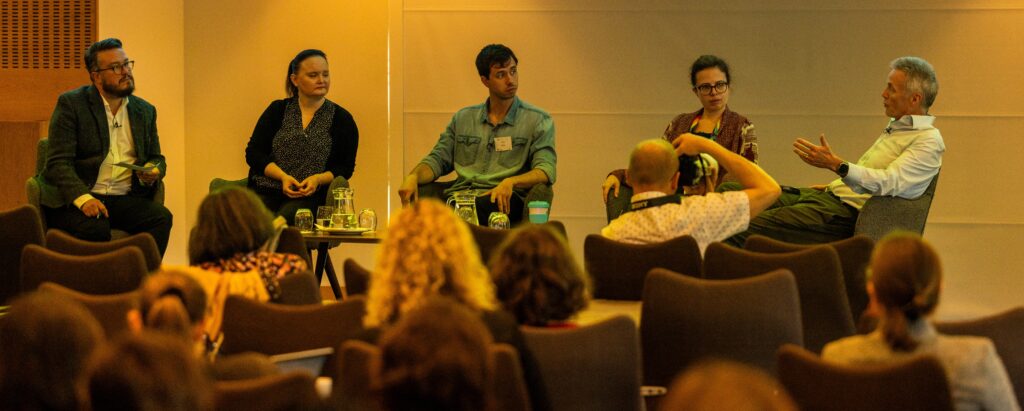
Plenary panel – photo credit: Eugen Stoica
The events kicked off with a plenary panel featuring Nick Wise (University of Cambridge), Rowena Lamb, Malcolm Macleod, and Katie Nicoll Baines (all University of Edinburgh) discussing the ways in which we can drive healthy and sustainable culture change and how this applies in the context of open research.
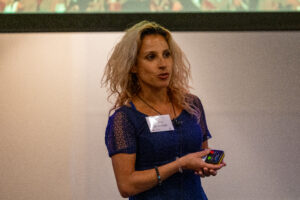
Marisa de Andrade delivering her keynote – photo credit: Eugen Stoica
Presentations and lightning talks touched on the topics of education and skills, research culture change, and next generation metrics. We heard from a diverse range of perspectives including technicians, researchers in both STEM and the humanities, and professional services staff. Equality, diversity, and inclusion (EDI) was a strong theme running throughout each of the presentations.
The keynote lecture was delivered by Marisa de Andrade on ‘The Madness of Metrics and Possibilities of Pause in Open Research’, which offered perspective on research metrics, what they really mean, and what really matters.
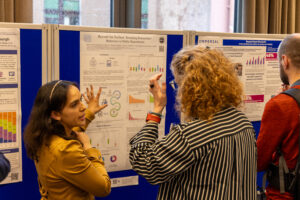
Poster session – Photo credit: Eugen Stoica
Following a busy day, the conference closed with a drinks reception and posters. Each presenter gave a quick-fire summary of their poster in a round of ‘Minute Madness’.
We want to thank everyone who attended the conference, our fantastic presenters, and of course our organisers Kerry Miller and Nel Coleman for making the day enjoyable and insightful. And if you missed it, be sure to come along next year!
Stay up to date on open research activities and future conference announcements by signing up to the Edinburgh Open Research Newsletter and joining our Edinburgh Open Research Initiative Microsoft Teams group.


 One of the ambitions for the EOR conference held in March, 2022, when we first started planning it was to make it as open and accessible as possible. To achieve this we made the whole event hybrid so that plenary talks, posters, and workshops were all accessible on the day to both in person and remote attendees. While this generally worked very well for both remote and in-person attendees, we also wanted to make it available to people who couldn’t attend on the day – so we recorded everything, and the recordings of the talks and posters can now be openly accessed through our Edinburgh Open Research journal at
One of the ambitions for the EOR conference held in March, 2022, when we first started planning it was to make it as open and accessible as possible. To achieve this we made the whole event hybrid so that plenary talks, posters, and workshops were all accessible on the day to both in person and remote attendees. While this generally worked very well for both remote and in-person attendees, we also wanted to make it available to people who couldn’t attend on the day – so we recorded everything, and the recordings of the talks and posters can now be openly accessed through our Edinburgh Open Research journal at 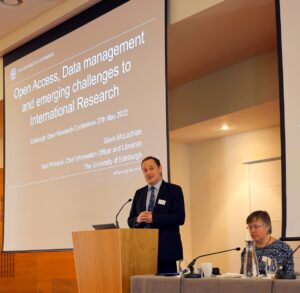 Attendees online and in person were treated to a fine and varied selection of talks. To begin with, topics ranged from Gavin McLachlan’s overview of current national and international political contexts and Dominic Tate’s review of the University’s Open Research Roadmap, to the latest in open access publishing from Rebecca Wojturska and Dominique Walker, FAIR principles from Susanna-Assunta Sansone, and Eugenia Rodrigues on inclusivity and Citizen Science.
Attendees online and in person were treated to a fine and varied selection of talks. To begin with, topics ranged from Gavin McLachlan’s overview of current national and international political contexts and Dominic Tate’s review of the University’s Open Research Roadmap, to the latest in open access publishing from Rebecca Wojturska and Dominique Walker, FAIR principles from Susanna-Assunta Sansone, and Eugenia Rodrigues on inclusivity and Citizen Science.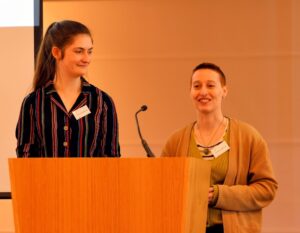 Nicely complementing Madeleine’s study, Emma MacKenzie and Felicity Anderson gave us the benefit of hands-on experience. Speaking from either side of the student-supervisor relation, they described their use of open source tools, materials, and mind-sets in student projects. Here, too, we saw the development of core competencies, this time including the documentation, discussion, and resolution of errors.
Nicely complementing Madeleine’s study, Emma MacKenzie and Felicity Anderson gave us the benefit of hands-on experience. Speaking from either side of the student-supervisor relation, they described their use of open source tools, materials, and mind-sets in student projects. Here, too, we saw the development of core competencies, this time including the documentation, discussion, and resolution of errors.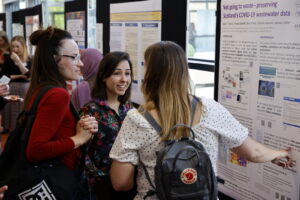 There were also poster sessions, culminating in first prize for Livia Scorza’s ‘Not going to waste – preserving Scotland’s COVID-19 waste water data,’ and there were workshops covering everything from public engagement to Open Research and AI.
There were also poster sessions, culminating in first prize for Livia Scorza’s ‘Not going to waste – preserving Scotland’s COVID-19 waste water data,’ and there were workshops covering everything from public engagement to Open Research and AI.